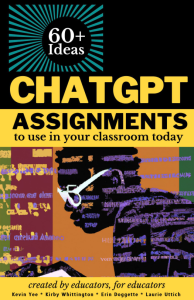Unleashing the Future: UCF’s Open Access Book Propels AI Education and Celebrates the Power of Open Access
Digital Initiatives, STARS Digital Repository Posted: November 16th, 2023Open access amplifies the impact of scholarly work and ensures that knowledge is not confined within the walls of academia but is freely accessible to educators, learners, and researchers globally. This democratization of information aligns with UCF’s values and its commitment to fostering a collaborative and inclusive learning environment.
Faculty at the University of Central Florida (UCF) are invested in teaching and learning with generative Artificial Intelligence (AI) and committed to open access by making scholarly works freely available to the public. The combination of these forces has led to the creation of the book ChatGPT Assignments to Use in Your Classroom Today. Authored by Kevin Yee, Kirby Whittington, Erin Doggette, and Laurie Uttich, this open access book is now freely available in the University’s digital repository, STARS (Showcase of Text, Archives, Research & Scholarship), ushering in a new era for AI education.
At its core, STARS serves as a centralized hub for storing, archiving, and sharing a diverse array of scholarly outputs. From digitized special collections and datasets to educational resources and publications, STARS breaks down traditional barriers, allowing knowledge to flow freely within and beyond academic circles. ChatGPT Assignments to Use in Your Classroom Today, which has exploded with over 8K downloads since it was added to STARS on October 23, 2023 (and over 1K downloads in the first 24 hours), stands as a testament to the profound impact of open access on scholarship and research on campus.
Reflecting on the motivation behind the project, Kevin Yee, the Director of the Faculty Center for Teaching & Learning at UCF, emphasized the foresight that led to its creation, saying, “We knew back in December 2022 that AI was going to be big, and it was going to change education permanently. We also knew that this was a prime opportunity for our office to do what we do best: investigate new ideas (or technologies) so that faculty don’t have to individually explore and discover. As we ran across best practices, we assembled them into this book.”
However, the significance of this release extends beyond its content. It is emblematic of the importance of a combination of open access and AI in shaping the future of education. Yee explains, “The book is laid out to be browsed through, even at a quick pace. Each mini-chapter has a short, descriptive title in large font designed to catch your eye – you flip through until you find something interesting, then read further. Most of the chapters are designed to give instructors plug-and-play GenAI assignments they can give to their students that, by their very nature, teach AI fluency and prompt engineering.”
For scholars and researchers, open access repositories provide a global platform to showcase their work, increasing visibility and citation rates. This not only accelerates the pace of academic discovery but also promotes interdisciplinary collaboration by facilitating the exchange of ideas across borders.
In the realm of teaching and learning, open access can enable educators to enrich their curriculum with many diverse materials. The STARS repository, for instance, has become a reservoir of open educational resources (OER), fostering innovation in pedagogy and facilitating the creation of new learning materials like ChatGPT Assignments to Use in Your Classroom Today.
Yee also underscores the ease of the process of submitting the book to STARS, stating, “From a technical standpoint, everything was very easy! All that’s required is a PDF file formatted and print-ready. We found the librarians at the UCF Libraries extremely helpful. Lily Dubach pointed us in the direction of the STARS repository, which is managed by Lee Dotson. Lee has been a delight. She worked with us to verify web accessibility, got it into the system quickly, and even re-uploaded a new version after we spotted a mistake.”
As ChatGPT Assignments to Use in Your Classroom Today becomes a valuable resource for educators and learners, it not only propels AI education forward but also exemplifies the power of open access in knowledge sharing and fostering discovery. Reflecting UCF’s mission in “unleashing the potential within every individual, enriching the human experience through inclusion, discovery, and innovation,” this resource ensures that its impact extends far beyond the confines of campus.

